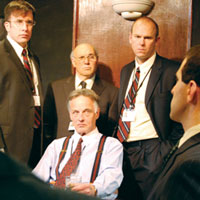We never learn just what the machers in Jason Wells' play actually do for a living. So densely coded is the corporatespeak that comprises their lingua franca that they could be politicians, bankers, industrial CEOs, advertising executives or athletic coaches. But what we soon learn after meeting them is that they want an opponent killed, and that they've hired a professional assassin to arrange it.
After that, the plan goes the way of all committee-implemented projects as they quibble over expenses, argue over minuscule details and explore inconsequential side-issues. (What was the Puritans' motive in burning witches? Did Judas try to weasel out of his betrayal?) By the end of the play, the proposed victim has escaped, the hitter has been shooed aside like an annoying kid brother, an honest man has committed suicide - and business proceeds as usual.
Should we be relieved at the incompetence of these would-be murderers? (A James Bond-styled concealed stiletto makes an appearance and is promptly rejected as useless.) Or should we be alarmed at the escalating enthusiasm they display toward their scheme, and their corresponding indifference to its consequences? As the tactical jargon of the boardroom and the sniper-nest gradually intertwine, the moral dimensions - not to mention the very real potential for slaughter of innocent bystanders - become increasingly subordinate to gadget-happy discussions of ballistics and biobombs, until even the martyr-elect calls upon unexpected reserves of casuistry when forced to bargain for his life.
Men of Tortuga drew considerable attention when it premiered at Steppenwolf Theater's First Look workshop in 2005, distinguishing itself from its genre by the author's concise skewering of fundamentally humane civil servants' progress from metaphorical warfare to primitive tribalism, but also through his clever employment of stichomythic dialogue delivered at Mametian warp-speed. (Characters respond instantly to each other's statements, only to admit immediately afterward, "I don't understand what that means.")
All these elements have been retained in the production currently running at Profiles Theater, where a stop-on-a-dime agile ensemble of actors, under the direction of Rick Snyder, keep us chuckling too comfortably at the testosteronic repartee to think about the disturbing implications of their personae's descent into savagery. That is, until it's over, when we look back (like the good citizens we are) and say, "How could we not have seen that?"

